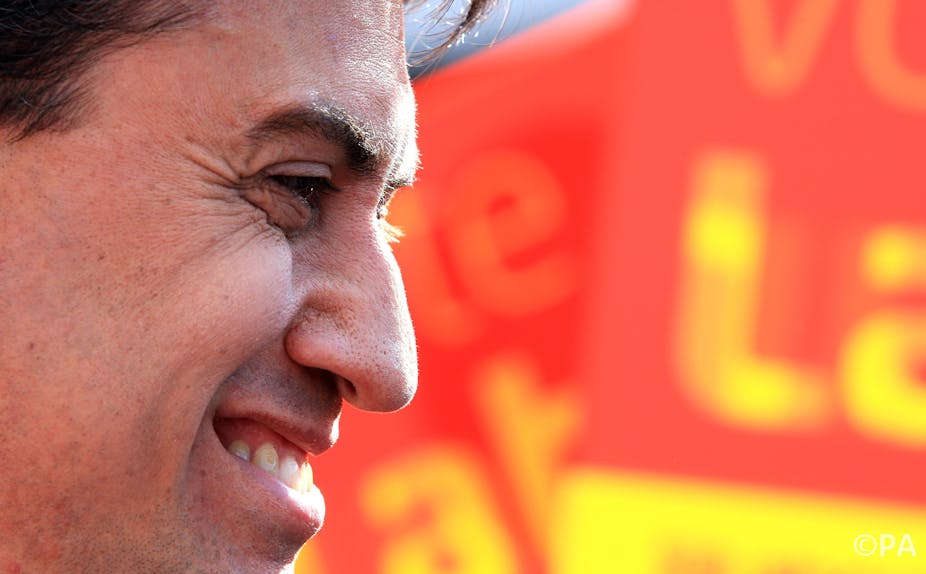It is still too early to say whether the leader of UKIP, Nigel Farage, will manage to deliver the earthquake to British politics that he has promised. But judging by the panic gripping the Labour front bench and backbenches, Farage is closing in on his goal.
The results of the Heywood and Middleton by-election, where Labour held on to a once safe seat by a margin of just 617 votes, woke up the party to the electoral threat it faces. Farage’s party is not just after Labour seats; it’s actually quite close to wining some. Advance polling suggests that Labour may lose three seats to UKIP at the 2015 general election.
Panic-stricken backbenchers are asking – no, demanding – that Miliband “do something” about UKIP, and want Labour to harden its message and policies on immigration and on Europe, but they usually don’t specify what these responses would specifically entail. And when they do, their proposals are almost impossible to deliver.
Get real
Take Frank Field, who wants Labour to impose work restrictions on citizens from the European Union’s ten newest member states. That proposal can only be delivered if and when all 28 EU member states agree to change the single market rules; in other words, it’s not going to happen any time soon.
Even worse, behind the panicky reactions of some Labour backbenchers (and some front benchers too) lies a misunderstanding of the real challenge UKIP poses.
Thanks to research by Rob Ford and Matthew Goodwin, we know that a substantial number of UKIP voters and sympathisers are in fact “left-behind” Labour supporters. Ford and Goodwin showed that people fitting this typical profile – the middle-aged white male with few qualifications – “no longer think about politics in general, or Labour in particular, in economic terms” and instead tend to associate the party with social liberalism and support for multiculturalism and immigration.
They are also so left-behind that they stopped voting Labour long before Miliband became Labour leader. This fact suggests that it will take far more than harsh policies on immigration to convince these voters to come back to Labour’s fold.
The implications of this are clear: these voters are not voting UKIP because they agree with all of its policies, and for most of them it does not really matter that UKIP’s policies do not add up. What matters is that Farage and his band of not-so-young Turks seem to speak their language, and seem to offer something different from “politics as usual”.
By the same token, it won’t really matter whether Labour becomes an anti-immigration party, because it’s the party’s overall outlook and image that are the real source of discontent.
Tread lightly
Labour has to be careful about how it pitches its policies. If Labour decides to target these left-behind voters (who constitute a shrinking constituency) with UKIP-style stances, it will surely alienate other key Labour supporters, namely women, the educated young, public sector workers, and the metrosexual urban professionals UKIP loves to hate – who tend to be more positive about immigration.
If Labour offers a noticeably UKIP-flavoured agenda, those voters may well consider voting for the Greens, for the SNP if they live in Scotland, or even go back to the Liberal Democrat fold.
It’s also clearly not the case that Miliband’s Labour has been insensitive to voters’ concerns about immigration. In his first speech as Labour leader, Miliband recognised that voters had reasons to be worried about immigration. He also recognised that as far as these concerns go, New Labour’s uncritical embrace of neoliberalism has a lot to answer for.
But in response, Miliband and Yvette Cooper, his shadow home secretary, have totally changed the party’s stance on immigration. They are now proposing a “balanced approach” that seeks to address these concerns in a way that does not alienate other key constituencies.
The illusion of balance
Miliband and Cooper have apparently come around to the idea that mass immigration from Europe has undercut wages, and has strained waiting lists for social housing, NHS services and schools.
Accordingly, their “balanced approach” includes proposals such as making the access to welfare benefits conditional on prior contributions to the tax and social security systems, increasing and enforcing the minimum wage, building more social housing, investing in the NHS, and tackling the cost of living crisis.
They have also promised to seek wider reforms of EU immigration rules – but any success on that score would obviously depend on very difficult negotiations with other member states.
These ideas might superficially address some of the concerns of many left-behind Labour voters now considering UKIP, but they are too subtle to deliver on the doorstep. They have also been presented in a typically timid fashion, and ultimately just don’t seem to amount to much.
But given that the strategy of trying to somehow outdo UKIP is electorally risky, Labour may have no choice but to pursue this “balanced approach” loudly and relentlessly until election day.

